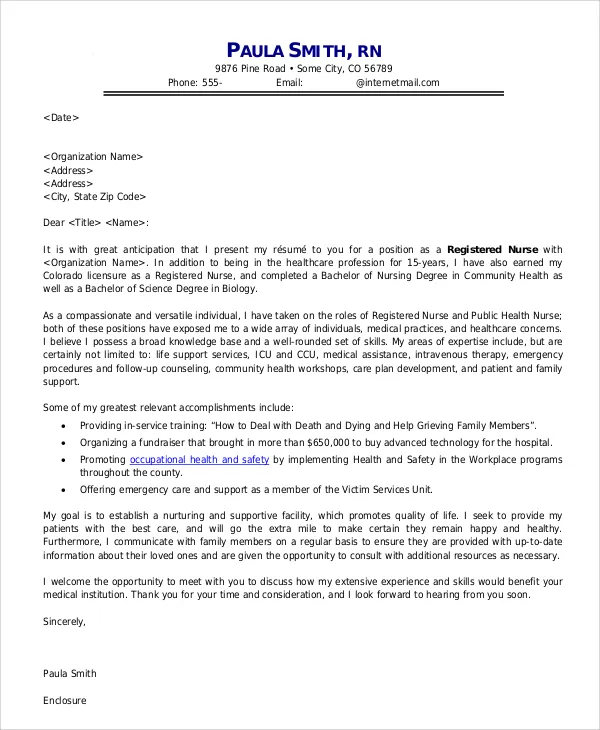Highlighting Your RN Experience
Your Registered Nurse (RN) cover letter is your first opportunity to make a strong impression on potential employers. This critical document allows you to showcase your experience, skills, and passion for nursing beyond what’s captured in your resume. Start by clearly stating the years of experience you possess as an RN. Be specific about your roles, responsibilities, and the healthcare settings you have worked in. Mention the types of patients you have cared for, and the specific procedures or treatments you have administered. Highlight any leadership roles you’ve held, such as charge nurse or preceptor, and quantify your achievements whenever possible. Emphasize your commitment to patient care and your ability to work effectively within a multidisciplinary team. A well-crafted cover letter is your key to securing an interview and taking the next step in your nursing career.
Quantifying Your Achievements
In your RN cover letter, avoid vague statements about your accomplishments. Instead, provide concrete examples and data-driven results to demonstrate your effectiveness. For instance, if you improved patient outcomes, specify by what percentage. If you implemented new procedures or protocols, detail how they enhanced efficiency or patient safety. Did you reduce medication errors or decrease patient falls? Provide the numbers. Did you train or mentor new nurses? Quantify the number of nurses trained and any positive outcomes that resulted from your training. Use metrics like the number of patients managed, the success rate of a particular procedure, or any cost savings achieved through your initiatives. These quantifiable achievements add credibility to your claims and make you stand out from other applicants. This is particularly important for an experienced RN looking to move into a more senior role.
Detail Your Skills and Expertise
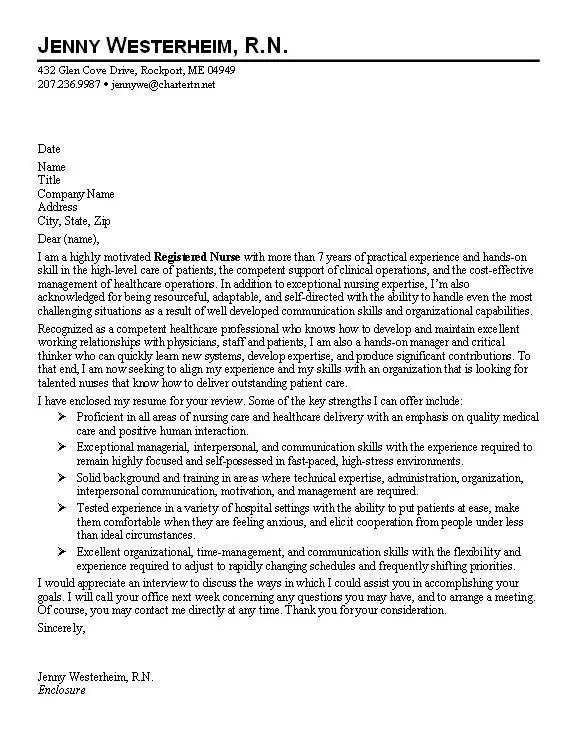
A strong RN cover letter must detail your specific skills and expertise. Go beyond simply listing your qualifications; provide examples of how you’ve utilized these skills in practical situations. Elaborate on your clinical proficiencies, such as IV insertion, medication administration, wound care, or patient assessment. Highlight your experience with electronic health records (EHR) systems and any proficiency in relevant medical software. Detail any specialized skills, such as critical care, telemetry, or emergency room experience. Mention your ability to work with diverse patient populations and tailor your care to meet their unique needs. Showcase your understanding of nursing principles and your ability to apply them effectively. Discuss your ability to prioritize tasks, manage stress, and make critical decisions under pressure, demonstrating not just what you can do but how well you do it.
Showcase Your Clinical Experience
Your clinical experience is the cornerstone of your RN cover letter. Focus on the specific clinical settings you’ve worked in, such as hospitals, clinics, or home health. Describe the patient populations you have experience with, whether it’s adults, children, or specific medical conditions. Highlight your experience in managing complex cases, coordinating care, and collaborating with other healthcare professionals. If you have experience in specialized areas, such as oncology, cardiology, or pediatrics, be sure to mention it. Give examples of how you’ve successfully managed patient emergencies, implemented care plans, and advocated for patient well-being. Mention any experience in telehealth or remote patient monitoring. Detail your ability to adapt to different clinical environments and provide high-quality care under varying circumstances. Focus on how your experiences align with the requirements of the job you are applying for.
Emphasizing Patient Care Skills
Patient care skills are crucial to highlight in your RN cover letter. Emphasize your commitment to providing compassionate and patient-centered care. Describe how you build rapport with patients, address their concerns, and explain medical information in an understandable way. Mention your ability to effectively communicate with patients and their families, fostering a supportive and trusting environment. Highlight your skills in assessing patient needs, developing care plans, and monitoring progress. Provide examples of how you’ve advocated for patient rights and ensured their comfort and safety. Detail your ability to collaborate with physicians and other healthcare professionals to deliver holistic patient care. Illustrate your dedication to patient education, helping patients understand their conditions and empowering them to take an active role in their health. The focus must be on creating a positive patient experience and promoting overall well-being.
Focus on Relevant Certifications
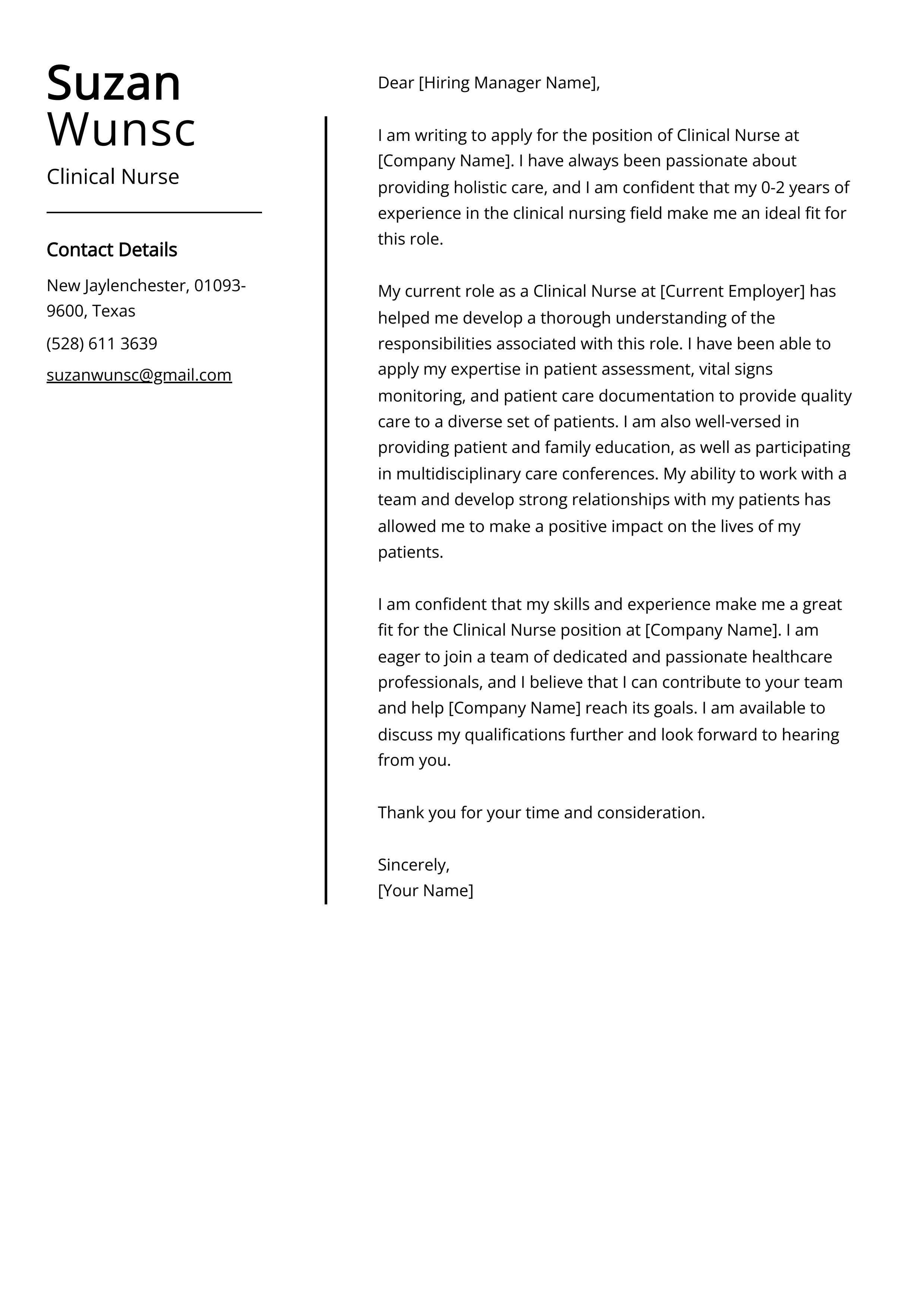
Your certifications are critical for an RN cover letter, especially those related to the job. Include all relevant certifications, such as Basic Life Support (BLS), Advanced Cardiac Life Support (ACLS), and any specialized certifications. Mention any certifications that align with the job requirements, such as critical care nursing (CCRN), emergency nursing (CEN), or other specialty certifications. Provide the name of the certifying organization and the date of certification. Ensure that your certifications are current and valid. Listing these certifications demonstrates your commitment to professional development and your ability to meet the specific requirements of the role. If you are in the process of obtaining a certification, mention it as well. Highlighting your credentials demonstrates your expertise and readiness to provide excellent care.
Demonstrate Your Teamwork Abilities
Teamwork is essential in nursing, so your RN cover letter must highlight your ability to work effectively with others. Provide examples of how you’ve collaborated with physicians, nurses, and other healthcare professionals to achieve positive patient outcomes. Describe your communication skills and your ability to contribute to a positive work environment. Mention your experience in mentoring or training new nurses. Highlight your willingness to assist colleagues, share knowledge, and support the team during challenging situations. If you have participated in interdisciplinary team meetings, detail your role and contributions. Describe how you resolve conflicts, address concerns, and promote a collaborative atmosphere. Illustrate your ability to be a team player and your commitment to contributing to a cohesive and supportive work environment. Your ability to work with others is a vital aspect of a good cover letter.
Express Your Professionalism
Your RN cover letter should reflect your professionalism. Demonstrate your commitment to ethical conduct, patient confidentiality, and adherence to nursing standards. Use professional language and maintain a positive and respectful tone throughout the letter. Highlight your ability to manage stress, handle difficult situations, and maintain composure under pressure. Mention your commitment to ongoing professional development and your willingness to stay current with the latest nursing practices and technologies. Showcase your strong work ethic, your reliability, and your dedication to providing high-quality patient care. Proofread your letter carefully to ensure that there are no errors in grammar or spelling. Presenting a professional image enhances your credibility and increases your chances of securing an interview.
Tailoring Your Cover Letter for Each Application
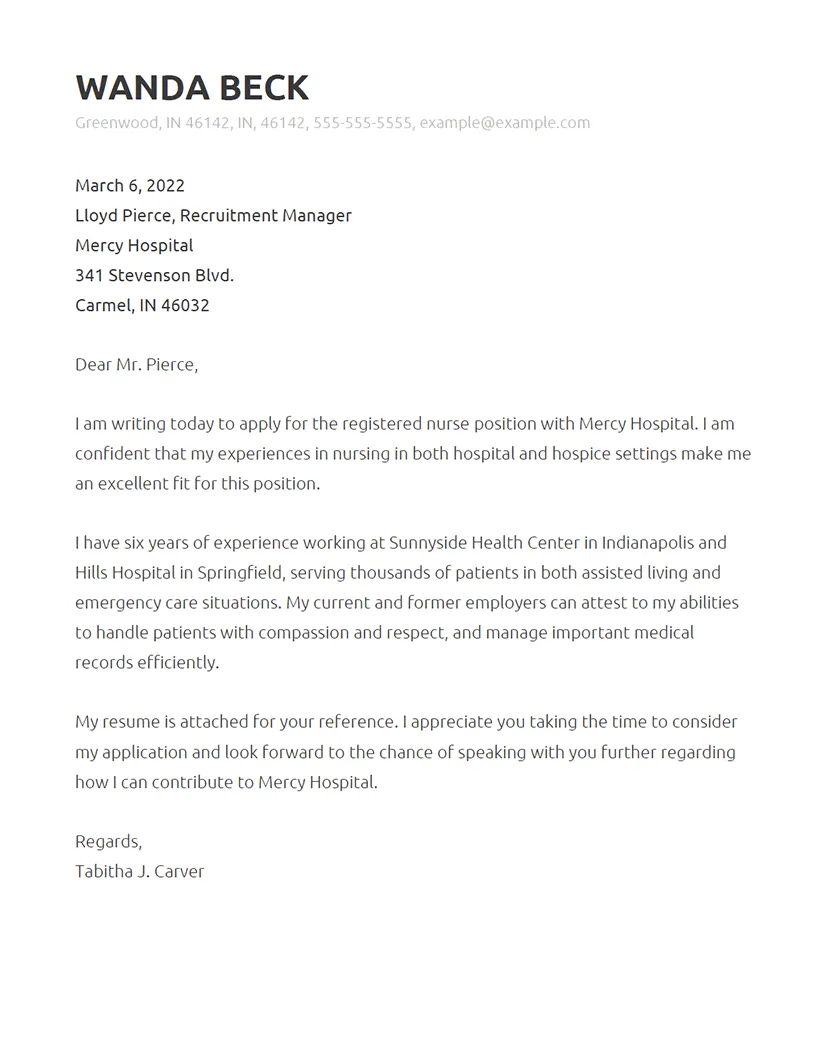
A customized RN cover letter is essential. Avoid using a generic template; instead, tailor each letter to the specific job and employer. Review the job description carefully and identify the key requirements and qualifications. Highlight your skills and experiences that directly align with those requirements. Research the employer to understand their mission, values, and priorities. Mention any specific initiatives or projects that resonate with you. Customize your opening paragraph to express your interest in the specific position and the organization. Use the language from the job description to demonstrate your understanding of the role. The goal is to show that you have a genuine interest in the position and that your skills and experience are a perfect fit. Taking the time to tailor your letter significantly increases your chances of getting an interview.
Researching the Employer
Before writing your RN cover letter, research the employer thoroughly. Visit their website, review their mission and values, and familiarize yourself with their services and programs. Look for any recent news or developments that you can mention to show your interest and knowledge. Check their social media profiles to understand their culture and values. If possible, research the hiring manager and address your letter to the appropriate person. Understanding the employer’s needs and priorities allows you to tailor your letter to their specific requirements. Mention any specific initiatives or projects that align with your own interests and expertise. Demonstrating that you have done your homework shows your initiative and genuine interest in the organization.
Addressing the Hiring Manager
Addressing the hiring manager directly in your RN cover letter is a sign of professionalism and attention to detail. Whenever possible, find out the name of the hiring manager and use it in the salutation. If the name is not available, use a professional greeting, such as “Dear Hiring Manager” or “Dear [Department Name] Hiring Team.” Avoid generic greetings like “To Whom It May Concern.” Personalizing your letter shows that you have taken the time to research the employer and understand the hiring process. If you have a referral, mention the person’s name and your relationship to them. Addressing the hiring manager directly adds a personal touch and increases the likelihood of your cover letter being noticed.
Following the Job Description
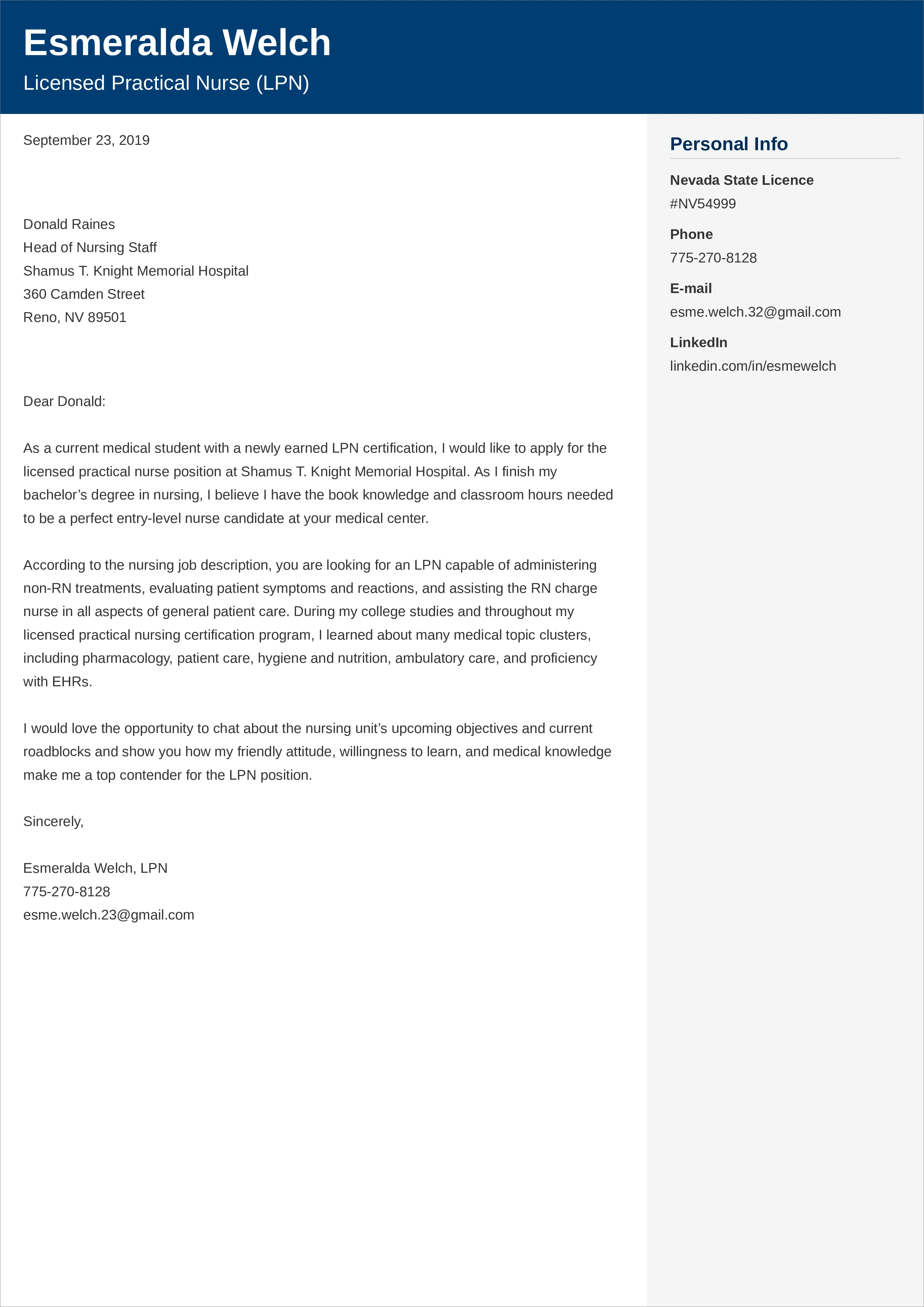
Carefully review the job description to understand the required qualifications, skills, and responsibilities. Use the same keywords and phrases from the job description throughout your RN cover letter. Structure your letter to address each of the key requirements, providing specific examples of how your experience and skills meet the needs of the role. Highlight your accomplishments and experiences that are most relevant to the position. Make sure your cover letter clearly demonstrates how you can contribute to the employer’s goals. Ensure that your cover letter clearly answers the questions the employer has. By aligning your letter with the job description, you increase your chances of getting noticed and securing an interview.
The Structure of an Impressive RN Cover Letter
An impressive RN cover letter follows a clear and organized structure. Start with a strong opening paragraph that captures the reader’s attention and states your purpose. In the body paragraphs, highlight your key skills, experiences, and achievements. Use specific examples and quantifiable results to demonstrate your effectiveness. In the closing paragraph, reiterate your interest in the position and the organization, and include a call to action. Clearly state your availability for an interview and provide your contact information. Maintain a professional tone throughout the letter and use proper grammar and spelling. Proofread your letter carefully before submitting it. A well-structured cover letter is easy to read and effectively communicates your qualifications.
Opening with Impact
The opening paragraph of your RN cover letter is crucial, as it sets the tone and captures the reader’s attention. Start with a compelling statement that immediately highlights your key qualifications or accomplishments. State your interest in the specific position and the organization. Mention any referrals, if applicable. Avoid generic openings like “I am writing to apply for the position of RN.” Instead, try a more impactful approach, such as: “With over [X] years of experience in critical care nursing and a proven track record of improving patient outcomes, I am eager to apply for the RN position at [Hospital Name].” This opening grabs attention and immediately highlights your most relevant qualifications.
Body Paragraphs Highlighting Key Skills
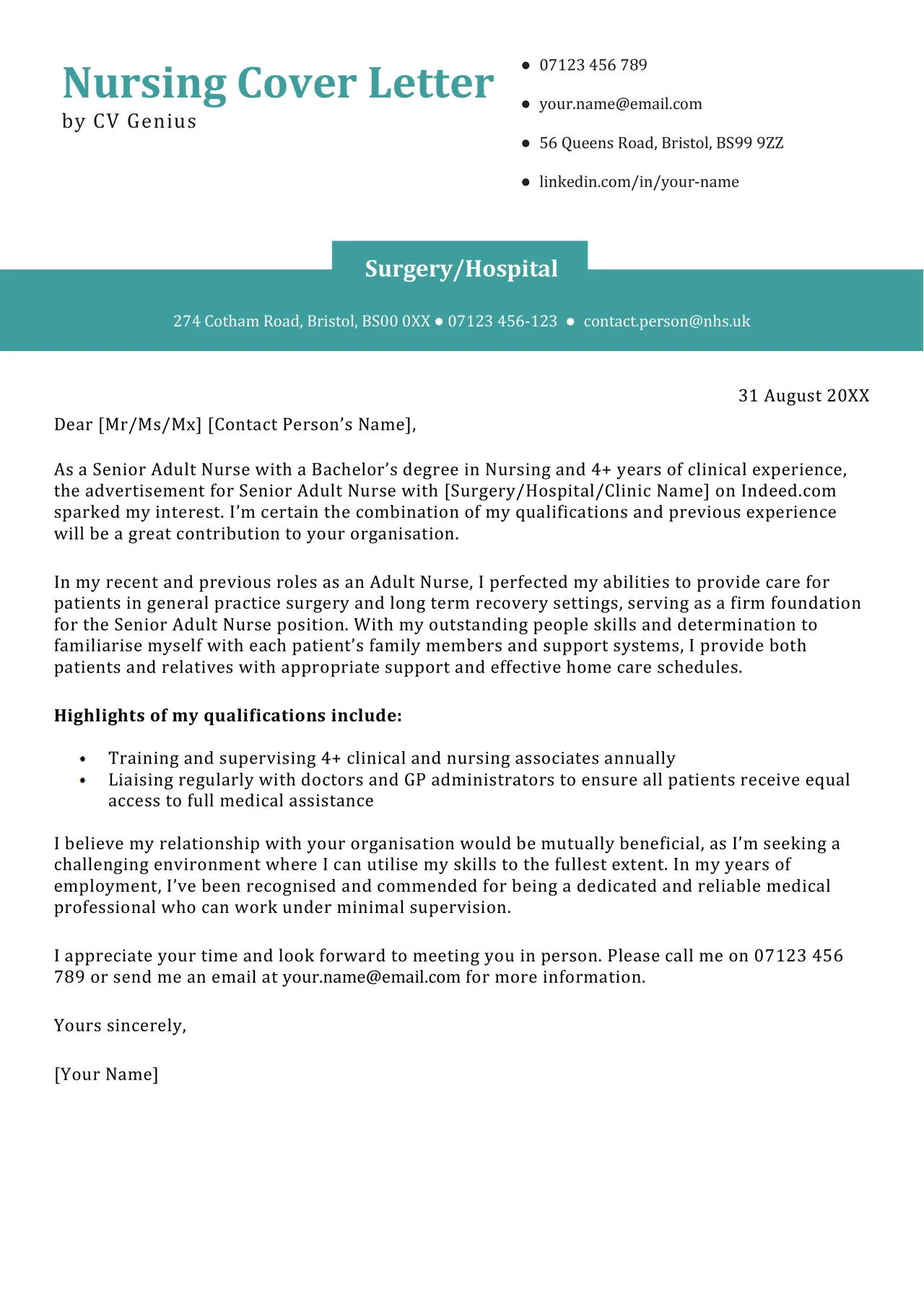
The body paragraphs of your RN cover letter should showcase your key skills and experiences. Each paragraph should focus on a specific area, such as clinical expertise, patient care, teamwork, or leadership. Provide concrete examples of how you have utilized your skills to achieve positive results. Use quantifiable achievements to support your claims. For example, instead of saying “I improved patient satisfaction,” say “I increased patient satisfaction scores by 15% through improved communication and patient education.” Highlight your skills and experiences that align with the requirements of the job description. Use keywords from the job description to demonstrate your understanding of the role. Use clear and concise language to make your letter easy to read.
Closing with a Strong Call to Action
Your RN cover letter should conclude with a strong call to action. Reiterate your interest in the position and the organization. Express your enthusiasm for the opportunity to discuss your qualifications further. Clearly state your availability for an interview and provide your contact information. Thank the hiring manager for their time and consideration. A strong closing paragraph leaves a lasting impression and increases your chances of getting an interview. Ensure that your closing is professional and reflects your commitment to excellence. Make it easy for the hiring manager to take the next step by providing all necessary contact information.
Formatting and Proofreading Your Letter
Proper formatting and careful proofreading are essential for a professional RN cover letter. Use a standard font, such as Times New Roman or Arial, with a font size of 11 or 12 points. Use one-inch margins and single-space your letter. Break your letter into well-defined paragraphs to improve readability. Ensure that your letter is free of grammatical errors, spelling mistakes, and typos. Proofread your letter multiple times, and ask a friend or colleague to review it as well. Use a spell checker and grammar checker, but do not rely on them entirely. Formatting and proofreading your letter carefully demonstrates your attention to detail and commitment to professionalism.
Using a Professional Font
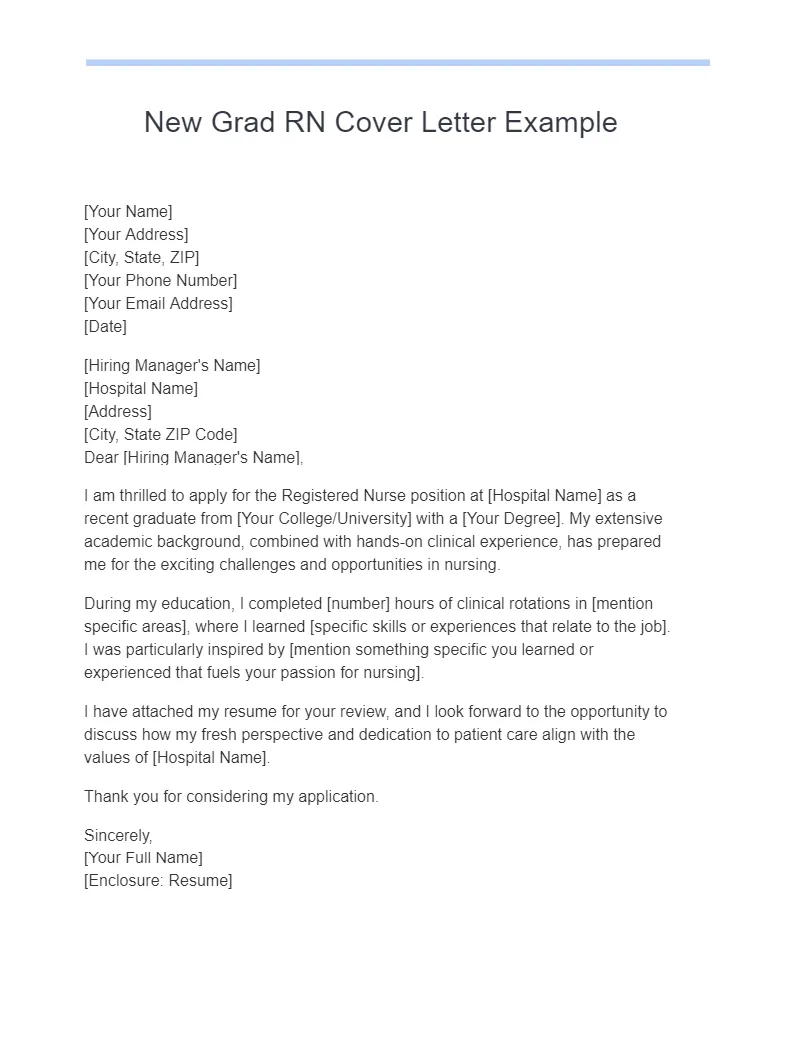
Selecting a professional font is crucial for your RN cover letter. Choose a standard and easy-to-read font, such as Times New Roman, Arial, or Calibri. Avoid using fancy or overly decorative fonts. Use a font size of 11 or 12 points to ensure readability. Consistency is key; use the same font throughout the entire letter. Using a professional font demonstrates your attention to detail and enhances the overall appearance of your letter. Stick to standard fonts as they are the most recognizable and easy on the eyes, making it easier for the hiring manager to focus on your qualifications.
Proofreading for Errors
Proofreading your RN cover letter is essential to avoid making a negative impression. Errors in grammar, spelling, or punctuation can undermine your credibility and make it appear that you are not detail-oriented. Proofread your letter multiple times, and read it aloud to catch any mistakes. Ask a friend or colleague to review your letter for you. Use a spell checker and grammar checker, but do not rely on them entirely. They may not catch all errors, particularly contextual ones. Pay close attention to proper names, titles, and dates. Carefully proofreading your letter demonstrates your professionalism and commitment to excellence.
The Importance of a Customized Cover Letter
A customized RN cover letter is vital for making a positive impression. Avoid using a generic template; instead, tailor each letter to the specific job and employer. Review the job description carefully and identify the key requirements and qualifications. Highlight your skills and experiences that directly align with those requirements. Research the employer to understand their mission, values, and priorities. Mention any specific initiatives or projects that resonate with you. The goal is to show that you have a genuine interest in the position and that your skills and experience are a perfect fit. A customized cover letter shows that you have taken the time to understand the organization and the specific requirements of the role, which significantly increases your chances of getting an interview.
Using Keywords from the Job Description
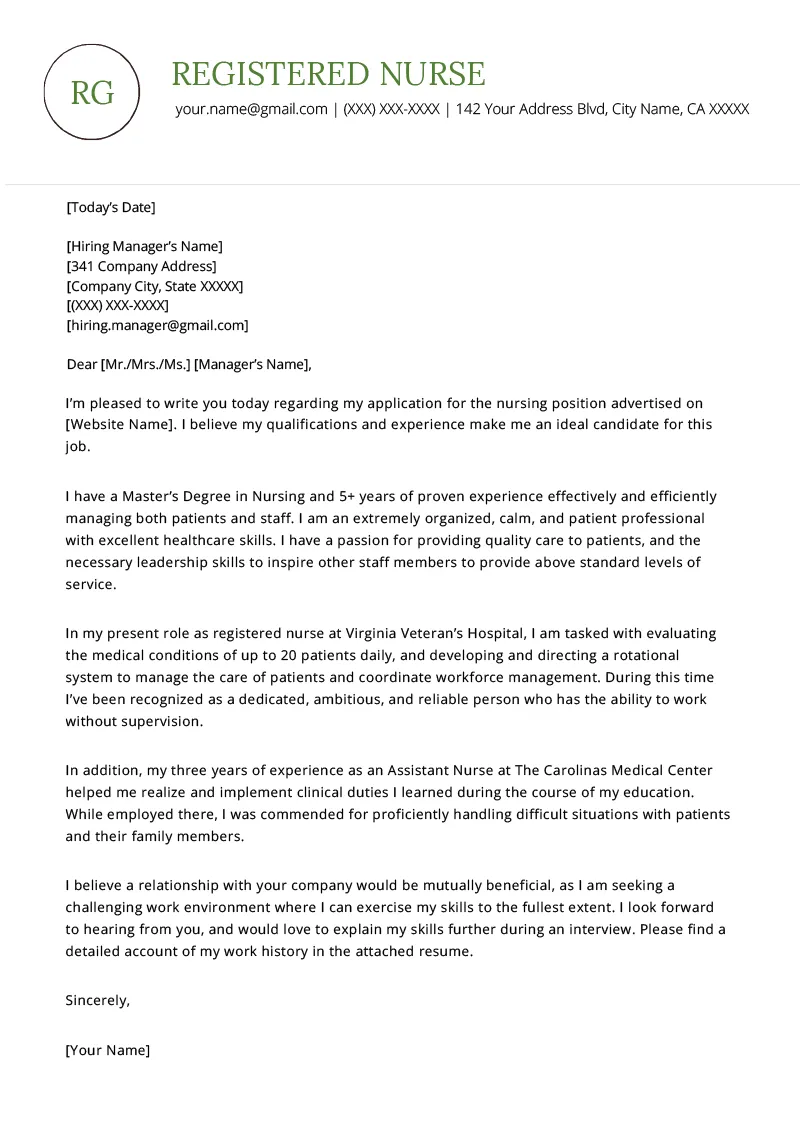
Incorporating keywords from the job description into your RN cover letter is a smart strategy to capture the attention of hiring managers and applicant tracking systems. Identify the key skills, qualifications, and responsibilities listed in the job description. Integrate these keywords naturally into your cover letter, highlighting how your experience and skills align with their needs. Use the same terminology and phrasing as the job description to demonstrate your understanding of the role. This helps ensure that your letter is easily scanned by applicant tracking systems and catches the eye of the hiring manager. Ensure you are not simply stuffing keywords, but weaving them into the text in a way that accurately reflects your skills and experiences.
Showcasing Your Passion for Nursing
Your RN cover letter should convey your passion for nursing. Express your genuine interest in providing high-quality patient care and your commitment to the nursing profession. Highlight what motivates you to be a nurse, and mention any specific areas of nursing that you are particularly passionate about. Share examples of how you have gone above and beyond for your patients. Show that you are dedicated to continuous learning and professional development. Mention any volunteer work or community involvement related to healthcare. Let your enthusiasm and dedication shine through to make a memorable impression. Conveying your passion can be the deciding factor that sets you apart from other candidates.
